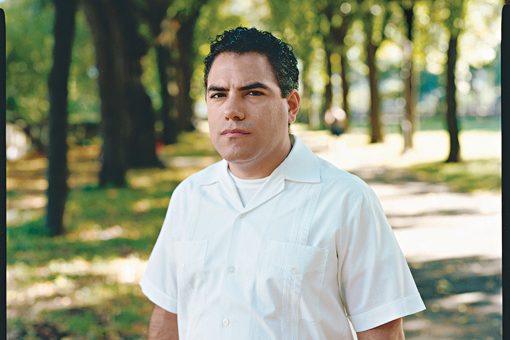Oriol Gutierrez first came out when he was a high school senior nearly three decades ago, telling his best friend, but not his family, that he was gay. It wasn’t until 1996 that he finally told his parents and sister the truth.
Yet Gutiérrez kept another secret from them for 12 more years: while serving in the U.S. Marine Corps Reserve, a routine checkup disclosed that he was HIV-positive. “I believed that the news that I was gay would be difficult enough,” the first-generation Cuban-American explained in an essay he wrote in 2008 for POZ, a magazine that offers health news, support and advice for the more than 1.1 million people in the U.S. living with HIV.
Attitudes have changed since then, and Gutierrez himself is one of the reasons. He now serves as editor-in-chief of POZ, after evolving from a loyal reader to a freelancer and then, six years ago, to deputy editor. Gutierrez, 44, a native of New York City, took over POZ as editor-in-chief in 2012—and he has since spearheaded the magazine’s efforts to raise awareness among critical audiences, including gay and bisexual Latino men, who account for nearly four out of five new HIV cases among Latino men in the U.S.
With effective treatment, most people diagnosed with HIV will not develop AIDS for many years, but late testing means that 36 percent of Latinos living with HIV are diagnosed with AIDS only a year after they are tested (compared to 31 percent of blacks and 32 percent of whites). “If Latinos are late testers, what does that say about the stigma in the Latino community about knowing your status?” Gutierrez asks. Meanwhile, he points out, African Americans, undocumented immigrants, the poor, and the homeless are also disproportionately affected by HIV. “You can’t get a test if you can’t afford one,” he says.
Under Gutierrez’ direction, POZ, which celebrated its twentieth anniversary in June, has devoted its editorial resources to overcoming the economic, cultural and legal barriers that contribute to late testing and treatment. Supported by ad revenue, POZ is published eight times a year and has a print circulation of 125,000—although its website, POZ.com, registers 450,000 unique visitors every month.
POZ.com has a “Latino” section, with Spanish-language fact sheets and articles in Spanish on navigating the Affordable Care Act. Gutierrez also runs TuSalud, launched in 2007, a Spanish-language magazine and website that concentrates on fitness and nutrition as well as HIV, hepatitis B and C and other health concerns that disproportionately affect Latinos.
Under Gutierrez, POZ has focused on telling personal stories as a means to understanding larger topics such as HIV and mental health, discriminatory legislation and the virus’ impact on women and minorities.
Gutierrez says that as the AIDS epidemic receives less attention, it’s “natural” that many HIV-negative LGBT activists have moved on to other struggles, like marriage equality and housing discrimination. “But that leaves a vast majority of people with the virus out in the cold,” he says—making POZ’s mission more urgent than ever.





